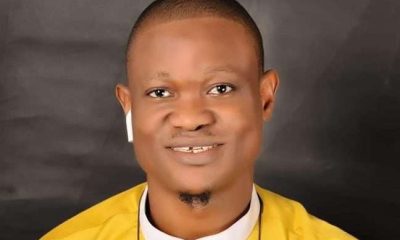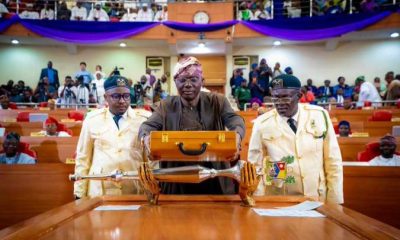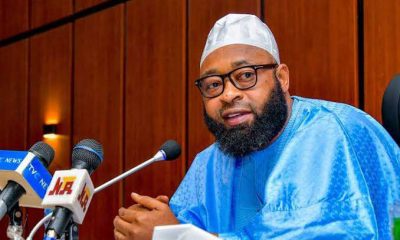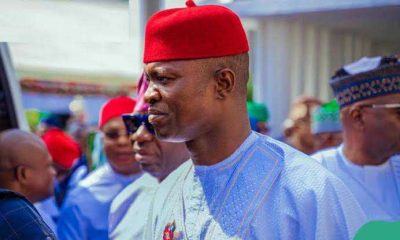Politics
Gov. Nwifuru at Halftime: Mobilizing human capital for development in Ebonyi

Abakaliki, the Ebonyi State capital, now wears a vibrant look. The commercial motorcycle and tricycle operators that traverse the city’s expanse may give an impression of haphazardness, especially within the transport sector, but it’s typical of Nigeria. The beehive of activity at the International Market and elsewhere points to a reviving economy. Residents attribute this progress to a different style of governance—one that prioritizes people over infrastructure.
“At least now, people can sell their wares in the market, unlike before. Government officials no longer chase people all over the market,” said Ugwu Onyi, a trader.
“Nobody is complaining in Abakaliki now. Traders are no longer being harassed, and workers are no longer complaining because they are being paid well. Last December, they received N200,000 as a Christmas bonus.”
Hon. Francis Ogbonnaya Nwifuru, the state governor, who is marking his second anniversary in office, has not impressed everyone, however. Some alleged loyalists of his predecessor, David Umahi—the current Minister of Works—appear particularly displeased, and their dissatisfaction has found expression through social media criticisms. On the ground, however, locals claim their lives have improved. Unlike his predecessor, Governor Nwifuru pays workers well, which has injected desperately needed liquidity into the Ebonyi economy.
Last week, the governor approved a significant increase in the salaries and allowances of newly recruited medical doctors in the state’s public health sector—from N150,000 to N500,000 monthly. He said the decision followed public feedback and internal assessments which revealed the inadequacy of their previous remuneration.
“Some people who had opined that the youths were not ripe to assume leadership of the state at the highest level have been stunned and roundly disappointed by the superlative performance of His Excellency, Rt. Hon. Francis Ogbonna Nwifuru’s administration in the past two years,” Engr. Engr. Jude Chikadibia Okpor, the state commissioner for information told Business Hallmark.
“It has been a rewarding journey that has not only met expectations favourably, but one that has surmounted all the bars. Under the present administration, Ebonyians have harvested people-oriented democratic dividends.”
Umahi’s administration was noted for its infrastructural exploits. He constructed numerous roads, flyovers, an international market, a conference centre, and an airport—though critics insist the latter is a needless white elephant project. Despite reportedly consuming over N55 billion in maintenance costs, the airport remains out of use. Nonetheless, Umahi remains popular among many residents for his development push. Yet, workers who felt short-changed during his tenure still nurse grievances.
His administration also emphasized discipline. Rules barring traders from selling in unauthorized areas were harshly enforced—even though many couldn’t afford shops in designated markets. Taxation was also said to be burdensome. Today, all that has changed. There are no more state officials to harass traders, provided they do not trade in the streets. Residents say they are better off for it. The downside, however, is that the lack of strict rules appears to have led to increased littering of streets and major roads.
The Ebonyi State Waste Management Authority is tasked with regulating and disposing of waste, yet a walk through the state capital reveals litter at a number of spots. The agency is evidently underperforming.
“The only complaint we have is that Abakaliki is becoming dirty. Before, the environment was well maintained, but that has changed,” said a resident who gave his name as Ebubechukwu. “Apart from that, I’d say the governor is trying. He’s building roads, bridges, and boreholes in the villages. He’s also working on roads in the town. He hasn’t matched Umahi in terms of infrastructure, but it’s work in progress.”
Engr. Okpor, however, insists that the point about the state’s inability to manage waste is incorrect, while revealing that efforts are being made in this regard. “While I may not agree with your assertion, I can assure you that the state government has procured refuse management machines to ensure a more efficient and effective waste management practice in the state,” he said.
Meanwhile, while admitting that based on his performance, Nwifuru would easily win a second term if elections were held today, Ebubechukwu argues that in the event of a political fallout with his predecessor, many people might still rally behind Umahi.
Nwifuru’s rise to power was largely engineered by Umahi, who publicly endorsed him as his successor in 2022. That endorsement, coupled with Nwifuru’s loyalty as Speaker during Umahi’s eight-year rule, secured him the All Progressives Congress (APC) ticket and ultimately, the governorship.
But since assuming office, Nwifuru has struggled to dispel perceptions of being under Umahi’s influence. Political observers point to the retention of several Umahi-era commissioners as evidence of continuity rather than change.
“People say he is a puppet of Umahi, and that’s not far-fetched considering his cabinet’s composition,” said a political science lecturer at Ebonyi State University, who requested anonymity. “Until he asserts himself, those perceptions will persist.”
The governor’s recent actions suggest a desire to change that narrative. He has reportedly resisted pressures to retain certain influential appointees and has begun promoting a more technocratic approach to governance. Insiders say he is eager to replace political loyalists with professionals who share his vision.
Defending his choices, Nwifuru said, “You cannot build a house and then set it ablaze simply because you want to be seen as doing something new. What matters is the result.”
Nonetheless, civil society actors argue that continuity should not come at the expense of innovation and accountability.
“We need a break from the past. The current administration must show that it’s not just a continuation of Umahi’s government with a new face,” said Chibuzor Okorie, a public affairs analyst based in Abakaliki.

Senator Umahi and Governor Nwifuru
Some analysts say some signs of friction between the two leaders showed during the nomination process for Umahi’s Senate replacement. The discord, according to them, grew more pronounced late last year over the fate of the APC state chairman, Stanley Okoro-Emegha. On January 3, Umahi led a delegation to pay New Year’s homage to Nwifuru in his hometown of Oferekpe Agbaja, Izzi LGA, and used the occasion to endorse him for a second term—the second such endorsement in a matter of weeks.
The move was perhaps an attempt to stoop to conquer, but sources say it may not have worked. The governor appears determined to assert his authority. Sources within the ruling party say a cabinet reshuffle is imminent—likely by June.
“Governor Nwifuru wants to structure his government to be independent,” a source close to power circle in Abakaliki told Business Hallmark. “Right now, the cabinet comprises Umahi’s loyalists and Nwifuru’s own men. The reshuffle will allow him to take full control.”
In early April, Nwifuru reportedly ordered the arrest of six commissioners and contractors over allegations of sabotaging state projects. The affected commissioners included Prof. Omari Omaka (Tertiary Education), Victor Chukwu (Environment), Ifeanyi Ogbuewu (Culture and Tourism), Uchenna Igwe (Local Government and Chieftaincy Matters), Dr. Moses Ekuma (Health), and Felix Igboke (Project Monitoring). The Chairman of Afikpo LGA, Mr. Timothy Nwachi, was also named.
However, as public outrage grew over the drastic action, the government denied it. A statement by Chief Donatus Ilang, Commissioner for Border, Peace and Conflict Resolution and head of the monitoring committee for housing projects, dismissed the report as “false and unfounded.”
“No commissioner was arrested. You can confirm this from the police and other security agencies,” he said. “The governor merely expressed displeasure and asked for compliance. The talk of arrests is a fabrication.”
Still, a Government House source maintained that the arrests did happen and were broadcast by state-owned radio stations. The move, the source said, was part of the build-up to a cabinet reshuffle.
“The affected commissioners were accused of poor performance in monitoring contracts. But as pressure mounted, the administration denied the arrests. It’s all part of the governor’s plan to remove Umahi’s men and assert control,” the source said. “Don’t forget, he suspended some commissioners earlier too.”
Indeed, on March 18, 2025, the governor suspended three commissioners—Solomon Azi (Grants and Donor Agencies), Victor Chukwu (Environment), and Ikeuwa Omebe (Rural Development)—for absenteeism from official duties.
Meanwhile, the governor’s camp, through APC Chairman Okoro-Emegha, has been actively courting opposition figures and Umahi’s political adversaries. Recently, the immediate past acting chairman of the PDP in the state, Ifeanyi Nworie, defected to the APC with hundreds of his supporters.
“We have fought a lot, and we can see that Governor Francis Nwifuru and the APC mean well for the state,” Nworie said. “Our defection is to support the governor in bringing democratic dividends to the people.”
Okoro-Emegha had also wooed Chief Abia Onyike, a former commissioner for information and vocal critic of Umahi, into the APC.
There is no denying that Umahi gave Ebonyi, particularly Abakaliki, a facelift. His development feats earned him widespread praise and his current position in President Tinubu’s cabinet. However, critics like Onyike argue that some of his grandiose projects lacked relevance to the common man.
“This new government is more focused than Umahi’s,” said a party chieftain who declined to be named. “Umahi was building white elephant projects while people suffered. He was using his own company, so he paid himself all along.”
Governor Nwifuru has chosen a different path. His administration appears people-centric. Yet some critics argue that the pace of development has slowed.
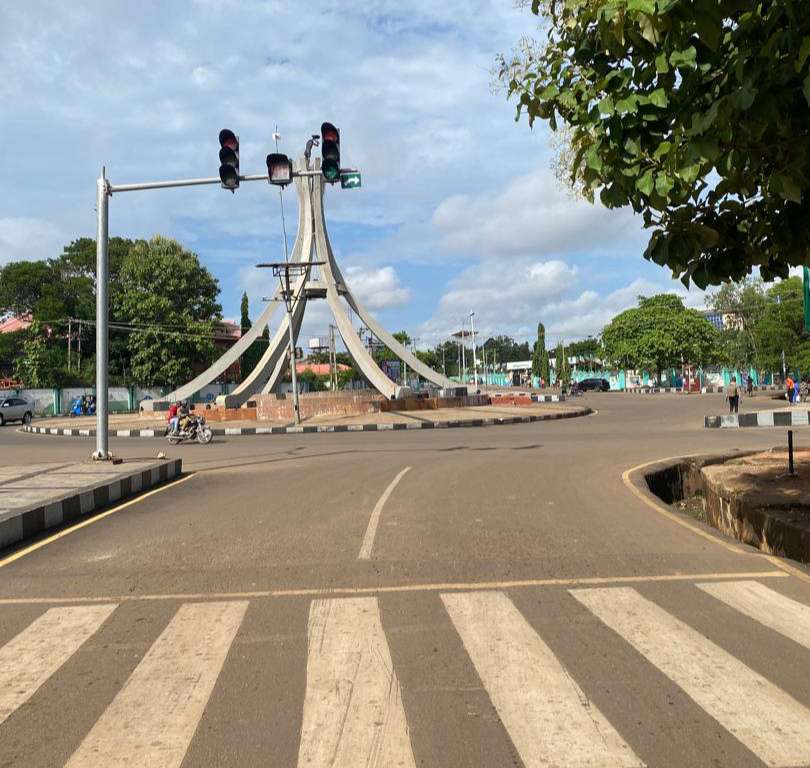
Popular Udensi Roundabout at the heart of Abakaliki. Tuesday, May 20, 2025
But the claims may not reflect the reality. While Umahi prioritized monumental infrastructure, basic amenities like pipe-borne water were neglected. Nwifuru’s administration is reviving water supply, signaling a shift toward improving quality of life.
Health
Governor Francis Nwifuru appears to be taking decisive steps to address long-standing challenges in Ebonyi’s healthcare system—an area previously marked by underfunded and understaffed general hospitals. Until recently, the state’s 14 general hospitals operated with a skeletal workforce, limiting their capacity to deliver quality care.
Observers say the situation has significantly improved under Nwifuru’s administration. The government has recruited more doctors, pharmacists, laboratory scientists, and physiotherapists for each hospital. In addition, official vehicles have been provided to health workers, enabling them to reach rural communities and deliver essential healthcare services.
Notably, the administration recently hired 328 registered community health practitioners. The chairman of the National Association of Community Health Practitioners of Nigeria (NACHPN), Ebonyi State chapter, Chetachi Usulor, described the recruitment as “a significant step toward enhancing healthcare service delivery.”
In December 2024, at a handover ceremony organized by Médecins Sans Frontières (Doctors Without Borders) in Abakaliki, the governor announced plans to establish one specialist hospital in each of the state’s three senatorial zones to improve healthcare access. The state has also procured four MRI machines and essential supplies for 13 general hospitals. Furthermore, 195 healthcare workers were employed and their salaries increased from N150,000 to N500,000.
To boost emergency response and field operations, 42 SUVs were distributed to doctors, 20 ambulances deployed across the state, and motorcycles provided to rural health workers. The administration also earmarked N100 million for routine immunization programs and launched awareness campaigns targeting cancer, sickle cell disease, and epidemic prevention.
Beyond personnel and equipment, the government is investing in healthcare infrastructure by upgrading existing hospitals and building new health centers. A state-of-the-art diagnostic center is also in development to reduce the need for long-distance travel for specialized care. In major hospitals, modern maternity wards and neonatal care units are under construction to combat maternal and infant mortality. Mobile clinics and rural outreach programs have also been introduced to serve remote and underserved communities.
Infrastructure
The Nwifuru administration has placed emphasis on infrastructure development, with significant progress in the construction and rehabilitation of roads, bridges, and public utilities. The state Commissioner for Project Monitor, Engr. Felix Igboke, disclosed at the weekend that the administration has constructed over 200km of roads in different parts of the state within two years in office.
Completed projects include the Ishielu Water Works Road, Nnorom Street, Udude–Ukwuakpu Street, Emefor Street, and Alo Street. Ongoing projects span the 23km Ezillo–Ezzagu Road, 10.1km Ovudechi–Iziogo Road, 3.76km Ihemechi–Okposi Road, and 7.23km Iziogo–Ndiokeeda Road. The administration is also advancing urban renewal projects such as Ayodele Junction–Erei Road and the Akanu Ibiam Roundabout–Oyoyo Junction–Presbyterian Church Road corridor.
State of the Economy
Despite its Gross Domestic Product (GDP) ranking at 25th among Nigerian states, with an estimated GDP of $2.9 billion and GDP per capita of $948, Ebonyi’s full economic potential remains untapped. Renowned for its Abakaliki rice and endowed with mineral resources such as lead, zinc, limestone, granite, and salt, the state is yet to fully harness its industrial and agricultural capacities. While local mining of lead and zinc occurs, large-scale commercial operations have yet to take off.
Nonetheless, the state’s Internally Generated Revenue (IGR) has grown impressively—from N12.42 billion in 2022 to N30.84 billion in 2023. In the N444.98 billion 2025 budget, dubbed the “Budget of Economic and Social Development,” the government allocated N169.90 billion to IGR—a massive leap from the N28.5 billion earmarked in the 2024 budget, of which 78.1% had been realized by Q4 of that year.
Politics of 2027 Taking Centre Stage
As 2027 approaches, political tension is allegedly brewing quietly between Governor Nwifuru and his predecessor, Senator Umahi, over the control of APC structure in the state. Umahi, who reportedly fell out with the state party chairman, Okoro-Emegha, following the December 2022 violence in Ekoli-Edda, is said to be pushing for a new chairman after his first term. However, Nwifuru has endorsed Okoro-Emegha for re-election.
“The cold war between the governor and Umahi is still ongoing, but I don’t think Umahi can do anything,” a senior party source confided. “Nwifuru has more political experience and control—this is not like the Rivers State scenario. He holds the party structure and the state assembly. He was speaker for many years and knows Umahi very well.”
The source added that comparisons between Umahi and former Rivers governor Nyesom Wike are misplaced. “They don’t have the same political mandate. Tinubu is invested in Wike because of Rivers’ wealth and strategic importance. Umahi does not have that kind of leverage.”
On the streets, there is a growing perception that while Umahi remains influential, Governor Nwifuru enjoys broad grassroots support.
“Political wars are no longer being fought and political tension has reduced significantly,” said Nwibo Abel, a shop owner in Abakaliki. “There used to be harassment of traders under the old administration. Now, you’re free to trade as long as you’re not obstructing roads. People appreciate that.”
Abia Onyike, a former information commissioner who recently defected from the PDP to APC, echoed similar sentiments.
“Governor Nwifuru is performing very well,” Onyike said. “He’s reviving the education and health sectors, investing in infrastructure, and promoting peace. He is not creating political enemies or chasing shadows.”
The information commissioner, Engr. Okpor, noted however, that the governor is focused on delivering governance, and will continue to prioritise the people.
“In the second half of the first term, Ndi Ebonyi should expect nothing less than invigorated actions towards the full translation of the People’s Charter of Needs policy into practical realities,” he said. “The administration will continue to give priority to what the people want.”


